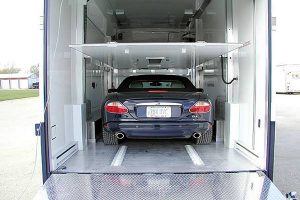Introduction: Exploring Vehicle Shipping Options For Dead Batteries
When it comes to shipping a vehicle to or from Canada, many individuals may wonder about the logistics of transporting a car with a dead battery. Whether you are moving to another country or purchasing a vehicle from overseas, understanding the available shipping options for vehicles with dead batteries is crucial.
Shipping a car with a dead battery can present some challenges, as it may affect certain aspects of the transportation process. However, thanks to modern advancements in auto transport services, there are reliable solutions available that cater to such circumstances.
Enclosed auto transport is one option that can provide secure and efficient shipping for vehicles with dead batteries. Enclosed carriers offer additional protection compared to open carriers, shielding your vehicle from potential damage caused by external factors such as weather conditions and debris. This option ensures that your vehicle remains in pristine condition throughout its journey.
However, it’s important to note that while enclosed auto transport provides extra security and protects your car during transit, it does not address the issue of the dead battery itself. Therefore, prior arrangements should be made regarding the handling of your vehicle upon arrival at its destination.
In this article, we will delve further into the topic of shipping vehicles with dead batteries using enclosed auto transport services. We will explore various considerations and guidelines to help you make an informed decision when choosing the right transportation method for your car.
Understanding Enclosed Auto Transport: What It Entails
When it comes to shipping a vehicle, especially across international borders like Canada, enclosed auto transport is often the preferred method for many individuals. This specialized service ensures that your vehicle is protected from various external elements and potential damages throughout its journey. Enclosed auto transport involves transporting vehicles in fully enclosed trailers, providing an extra layer of security and protection compared to open-air carriers.
These trailers are equipped with soft ties or straps to secure the vehicle in place, preventing any movement during transit. Additionally, the enclosed design shields your vehicle from adverse weather conditions, road debris, and other potential hazards. One common concern for individuals considering enclosed auto transport is whether a dead battery would pose any issues during shipping. Fortunately, most professional auto transport companies have suitable equipment to handle vehicles with dead batteries.
They typically utilize winches or ramps to carefully load and unload such vehicles onto the trailer without causing any damage. Furthermore, some reputable auto transport companies offer assistance with jump-starting your vehicle upon delivery if necessary. However, it is always recommended to inform the carrier beforehand about any issues with your vehicle’s battery so they can adequately prepare for its transportation.
Overall, understanding enclosed auto transport is crucial when deciding how to ship your vehicle safely across borders like Canada.
Shipping A Vehicle With A Dead Battery: Is It Possible?
Shipping a Vehicle with a Dead Battery: Is It Possible? When it comes to shipping a vehicle, one common concern is whether it can be transported if the battery is dead. The good news is that shipping a vehicle with a dead battery is generally possible, especially when using enclosed auto transport services to or from Canada. Enclosed auto transport provides an added layer of protection for your vehicle during transit.
These trailers are equipped with advanced security systems and climate control features, ensuring that your car remains safe and in excellent condition throughout the journey. Additionally, enclosed carriers typically have hydraulic lift gates that make loading and unloading vehicles with dead batteries easier. However, it’s essential to note that some additional steps may need to be taken for transporting a vehicle with a dead battery.
The auto transport company may require you to provide access to the vehicle’s interior so they can manually release the parking brake or move the car as needed during loading and unloading processes. It’s always recommended to inform your chosen auto transport company beforehand about the condition of your vehicle’s battery. This way, they can make necessary preparations and ensure smooth transportation.
Remember, keeping open communication with the company will help them provide appropriate assistance based on your specific needs. In conclusion, shipping a vehicle with a dead battery is possible when utilizing enclosed auto transport services.
The Benefits Of Enclosed Auto Transport For Dead Batteries
When it comes to shipping a vehicle with a dead battery to or from Canada, opting for enclosed auto transport provides several key benefits. While open carriers are commonly used for transporting vehicles, enclosed transport offers added advantages specifically tailored to the needs of vehicles with dead batteries.
First and foremost, enclosed auto transport ensures enhanced protection and security for your vehicle. The fully enclosed trailers shield your car from external elements such as harsh weather conditions, road debris, and potential vandalism. This level of protection is particularly crucial when dealing with a dead battery, as it eliminates the risk of further damage due to exposure during transit.
Furthermore, enclosed auto transport offers an extra layer of privacy. With fully covered trailers, your vehicle remains hidden from public view throughout the journey. This can be advantageous if you prefer not to advertise that your vehicle has a dead battery or if you simply value privacy regarding the shipment of your automobile.
Additionally, using an enclosed carrier minimizes the chances of any potential accidents or mishaps during transportation. The sealed environment ensures that your vehicle remains securely in place throughout the journey without any movement or shifting that could further damage the already disabled battery.
Overall, choosing enclosed auto transport when shipping a vehicle with a dead battery provides peace of mind by offering superior protection against external elements and ensuring added security and privacy throughout the entire transportation process.
Preparing Your Vehicle For Enclosed Auto Transport To Or From Canada
When shipping a vehicle with a dead battery using enclosed auto transport to or from Canada, it is essential to take certain steps to ensure a smooth and hassle-free process. Here are some important considerations when preparing your vehicle for enclosed auto transport:
1. Thoroughly clean the interior and exterior of your vehicle: Prior to shipping, make sure to clean your car both inside and out. This will allow the transport company to inspect your vehicle properly and note any pre-existing damages accurately. 2. Remove personal belongings: Take out all personal items from your car before shipping it. This includes loose items such as GPS devices, chargers, CDs, or any other valuable possessions that could get lost or damaged during transit.
3. Secure loose parts: Ensure that all loose parts are properly secured or removed. Items like antennas, spoilers, or detachable mirrors should be either securely fastened or detached entirely to prevent any potential damage during transportation. 4. Check tire pressure: Before handing over your vehicle for transport, check the tire pressure and make sure they are adequately inflated according to the manufacturer’s recommendations.
This will help maintain the stability of your car during transit. 5. Document existing damages: Take photographs of your vehicle from various angles before shipping it.
Safety Measures During The Shipping Process For Vehicles With Dead Batteries
When shipping a vehicle with a dead battery using enclosed auto transport to or from Canada, it is essential to take certain safety measures to ensure a smooth and secure process. Although a dead battery may seem like a minor concern, addressing it properly can prevent potential risks and complications during transportation. Firstly, it is crucial to inform the transport company about the dead battery in advance.
This allows them to make necessary arrangements and take appropriate precautions while handling your vehicle. The shipping professionals can then ensure that proper safety measures are in place throughout the entire process. To avoid any mishaps during loading and unloading, make sure to provide clear instructions on how to handle the vehicle with a dead battery. This includes informing the transporters about any special procedures or precautions required when moving an immobilized vehicle.
Additionally, securing all loose parts within the vehicle becomes even more important when dealing with a dead battery. Make sure that all loose items are safely stored away or removed altogether. This will minimize any potential damage caused by shifting objects during transit. Finally, it is advisable to have any necessary documentation readily available for both domestic and international shipments. Ensure that you possess all relevant paperwork such as ownership documents, customs forms, and insurance certificates well in advance of transportation.
Potential Challenges And Risks Of Shipping A Vehicle With A Dead Battery
Shipping a vehicle with a dead battery using enclosed auto transport to or from Canada can present several challenges and risks that need to be carefully considered. While it may seem like a minor issue, the condition of the battery can have significant implications during the shipping process. One of the primary challenges is related to loading and unloading the vehicle onto the transport truck.
Typically, vehicles are driven onto the truck’s trailer using their own power. However, if the battery is dead, alternative methods such as winching or pushing may need to be employed. These alternative methods can increase the risk of damage to both your vehicle and other vehicles in close proximity. Additionally, a dead battery means that essential functions like power steering and braking may not work properly during transportation.
This lack of control can further elevate the risk of accidents or damage occurring while your vehicle is being shipped. Furthermore, if you plan on shipping your vehicle across long distances, especially during colder months in Canada, a dead battery could pose difficulties upon arrival. Starting your car without any power source could prove challenging or impossible without external assistance. Lastly, it’s important to consider that some shipping companies may have specific policies regarding vehicles with dead batteries.
They may require additional services or fees to accommodate for this situation.
Cost Considerations And Insurance For Shipping Vehicles With Dead Batteries
When it comes to shipping a vehicle with a dead battery using enclosed auto transport to or from Canada, there are several cost considerations and insurance factors to take into account. Firstly, the cost of shipping a vehicle with a dead battery may be slightly higher compared to shipping one with a functioning battery. This is because additional precautions need to be taken during the transportation process.
Enclosed auto transport offers greater protection for your vehicle, ensuring it remains secure and shielded from external elements throughout the journey. However, when dealing with a dead battery, extra care must be taken while loading and unloading the vehicle onto the trailer. Professional transport companies may require specialized equipment or manpower to safely handle vehicles in this condition, resulting in additional charges.
Moreover, it is crucial to consider insurance coverage when shipping a vehicle with a dead battery. Most reputable auto transport companies provide insurance coverage for any damages that may occur during transit. However, it is essential to review their policies carefully before making any commitments. Confirm whether their insurance covers potential issues related to dead batteries or if you need to purchase supplemental coverage separately.
To ensure your peace of mind during transportation, consider discussing these matters directly with your chosen auto transport company. By addressing cost considerations and verifying insurance coverage in advance, you can make an informed decision while safeguarding your interests throughout the shipping process.
Conclusion: Making An Informed Decision About Shipping A Vehicle With A Dead Battery
When considering shipping a vehicle with a dead battery to or from Canada using enclosed auto transport, it is crucial to make an informed decision based on several factors. While it may seem convenient to transport the vehicle as is, there are certain considerations that need to be taken into account. Firstly, transporting a vehicle with a dead battery can pose challenges during the loading and unloading process.
Special equipment or additional labor may be required to safely maneuver the vehicle onto and off the transport carrier. This could potentially increase the cost of shipping. Secondly, if you are shipping your vehicle internationally, customs regulations in both Canada and your home country should be carefully examined. Some customs authorities might require that vehicles being shipped internationally have functioning batteries for security reasons.
Lastly, it is important to assess whether repairing or replacing the battery before shipping would be more cost-effective and convenient than transporting it with a dead battery. Consulting with professional auto transport companies can provide valuable insights regarding costs and logistics involved in both scenarios. Ultimately, making an informed decision about shipping a vehicle with a dead battery should involve evaluating factors such as safety concerns during loading/unloading, customs regulations for international shipments, and cost-effectiveness compared to repairing or replacing the battery.








